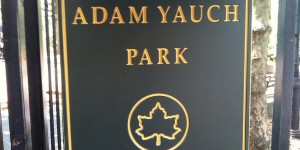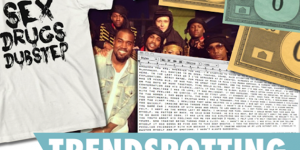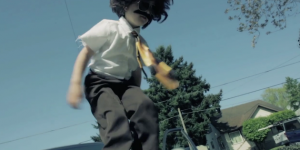TRENDSPOTTING: the Beastie Boys pass the mic to a new breed of rap-punks
by Richard Trapunski
May 10, 2012
Last Friday, Adam Yauch, a.k.a. MCA, one-third of New York’s hip-hop trailblazers the Beastie Boys, passed away at the age of 47. The death of a music icon offers pundits a chance to reexamine aspects of the act’s legacy, and Yauch’s has brought up dozens: sampling pioneer, hip hop field-leveler, film distributor, wisecracker, Free Tibet advocate – the list goes on. Over the better part of the last three decades, Yauch and the Beastie Boys have such a multi-faceted legacy, it’s hard to decide what to focus on.
Which is why it’s forgivable for most of the eulogies to start at the Beastie Boys’ landmark debut LP, Licensed To Ill, the first ever rap album to hit #1 on the Billboard chart. The Beastie Boys, however, started a few years earlier, not as a hip hop group at all, but as one of the first bands in New York City’s burgeoning hardcore scene.
The Beasties may have abandoned that sound for the hip-hop of Licensed (a sound they again mostly abandoned by their second, sample-saturated LP, Paul’s Boutique), but they never truly abandoned the ethos (and even stylistically, they often nodded at those roots). Given their immense success, both critically and commercially, it can be easy to forget that the Beastie Boys started as underdogs – a trio of Jewish white kids in a black-dominated genre. Much like their major influences (and sometimes collaborators), Bad Brains, with a prototypical hardcore DIY try-anything spirit, the Beastie Boys ignored the rules of their genre and democratized it in the process.
The group always felt uneasy about the success of their debut, the tongue-in-cheek irony of their snotty, beer-swilling, sometimes misogynistic frat-rap lyrics embraced a little too wholeheartedly by some fans (despite it being their signature hit, they rarely played “Fight For Your Right” live). Their early music was embraced for its irreverent youthfulness, but as they grew into elder statesmen they began using their platform to create discourse of non-violence, spiritual openness and political advocacy, without ever abandoning the hilarious wordplay or style-bending experimentalism that shot them to stardom. Even as they matured into rap veterans, they always remained hardcore kids at heart.
The interconnection between punk and hip hop isn’t often explored, but in the heyday of the Beastie Boys the two genres weren’t as distinct as they might now seem. As groups like Public Enemy and KRS-One used their platform as a way to fly in the face of the system – and do it loudly – the genre once reflected the angry, not-going-to-take-it spirit of early hardcore.
Nowadays, hardcore’s fingerprints can be tough to trace. Somewhere in its rise to arena-rock, festival-headliner status, hip hop became complacent. Popular young rappers seem more concerned with chilling out and smoking weed (i.e. A$AP Rocky, Wiz Khalifa, Curren$y) or flaunting their wealth (Kanye West & Jay-Z) than flying in the face of anything. Where angst does enter into the genre, it’s a result of too much success, too much privilege, too much comfort, too much Drake-filtered-through-Kanye loneliness at the top.
But to say that hip hop has completely lost its hardcore roots would be an oversimplification. Technological advancements in both recording and distribution have made it easier than ever for anyone with an interest in rapping or beatmaking, regardless of ability or age, to cut a record and find an audience online, without relying on outside forces. That independent resourcefulness matches both the DIY amateurism of punk and the get-your-name-out-there street distribution of early underground hip hop (it’s not just a quaint throwback that free online records are still referred to as “mixtapes”).
And it’s paying off; in the past couple of years, the major labels have been mining the underground, giving big contracts to indie artists like Kendrick Lamar, Azealia Banks and even Mr. Muthafuckin’ eXquire.
But perhaps the clearest link between the past and present is Odd Future. Though they’ve since been vilified for their casual misogyny, homophobia and party-at-all-costs high school schtick (sound familiar?), the adolescent collective were briefly celebrated as the most exciting thing in hip hop: a foul-mouthed, moshpit-leading collective of subversive shit-kickers with a sprawling catalogue of free, homemade music readily available on their website. The public obviously had an appetite for youthful irreverence in hip hop, and they went to actual teenagers to get it. It’s no surprise that they, too, soon found themselves backed by a major.
If anything, it’s more shocking to see Death Grips end up on Epic Records (a subsidiary of Sony). A Sacramento trio that includes experimental rock hero Zach Hill on drums, Death Grips are anything but easily palatable. A blunt-force mix of industrial, tech and noise, the group’s in-your-face militaristic volume, led by lead shouter Stefan Burnett, more closely resembles the anti-complacency of Public Enemy than anything current.
If the rise of Death Grips is any sort of indicator, the Beastie Boys won’t be the last group to bridge punk and rap. Far from it.
Tags: Music, Featured, News, Adam Yauch, Azealia Banks, Beastie Boys, Death Grips, Kendrick Lamar, Odd Future, Trendspotting





